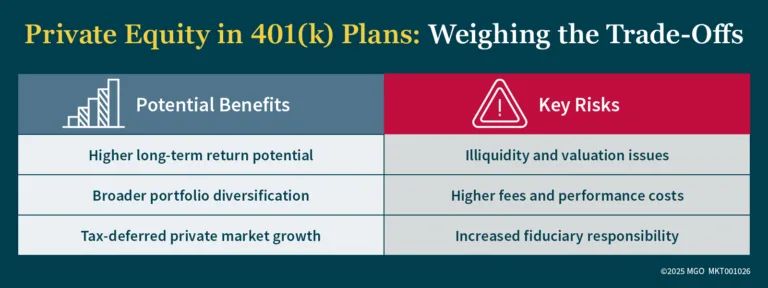- within Real Estate and Construction and Law Practice Management topic(s)
- with readers working within the Accounting & Consultancy industries
Key Takeaways:
- A new executive order may allow 401(k) plans to invest in private equity, hedge funds, and other alternatives typically reserved for institutions.
- Plan sponsors must weigh higher returns against risks like illiquidity, valuation challenges, and increased fiduciary oversight responsibilities.
- Legal and regulatory frameworks are evolving fast, requiring plan providers to strengthen transparency, fee structures, and participant education.
—
On August 7, 2025, President Trump signed an executive order directing the Department of Labor (DOL) and Securities and Exchange Commission (SEC) to expand access to alternative assets — including private equity, real estate, and digital assets — for 401(k) plans. The goal: open the door to private equity, hedge funds, real estate, and even crypto in retirement plan menus. As both 401(k) auditors and trusted advisors, MGO is helping plan sponsors understand what this expanded access to private equity means for governance and compliance.
Why This Matters Now
With fewer public companies and growing demand for diversified retirement options, private equity firms and plan administrators have been advocating for broader access to private markets. Major players like Blackstone, KKR, and Apollo are pushing to offer these strategies to everyday savers through target date funds and pooled investment options.
Regulators are responding, Trump's executive order is expected to accelerate this trend by instructing the DOL and SEC to build a framework for oversight and access. This move is positioned as a retirement security initiative to democratize access to high-quality investment options, aiming to empower over 90 million Americans currently excluded from alternative asset opportunities.
Potential Benefits
- Higher return potential: Private equity has historically delivered strong long-term performance, with average annual returns nearing 14% compared to ~8% for public equities.
- Diversification: Adding private market exposure can reduce correlation to public stocks and may help smooth volatility over time.
- Tax deferral: Returns on alternative investments in 401(k)s keep the same tax advantages as traditional plan assets.
- Expanded access: Ordinary investors gain exposure to asset classes previously reserved for accredited or institutional investors, democratizing retirement portfolio options.
Risks and Concerns
- Liquidity and transparency: Private investments are harder to value, less liquid, and more complex to manage than traditional funds.
- Fee structures: Management and performance fees are significantly higher than index funds, which can erode participant returns.
- Fiduciary exposure: Plan sponsors carry legal responsibilities under the Employee Retirement Income Security Act (ERISA). If alternatives are misused or misunderstood, liability risk increases.
- Focused investment risk: Private equity funds may concentrate on specific sectors or strategies, which can increase exposure to market shifts or operational volatility.
- Potential for loss: Like all investments, private equity carries risk — including the possibility of capital loss — despite the perception of higher returns.

Regulatory Momentum
The Trump administration's order builds on a 2020 DOL information letter that cautiously allowed private equity in defined contribution plans — but few sponsors acted. The new order goes further by directing agencies to build consistent frameworks for oversight, pricing, and participant protections.
The order also instructs the SEC to revise applicable regulations to support the inclusion of alternative assets in participant-directed defined contribution plans. The SEC has indicated it may issue new valuation and fee disclosure rules to support this shift.
What Plan Sponsors Should Do
| Step | Action |
| Stay current | Monitor new federal guidance and IRS/DOL bulletins. |
| Reassess governance | Evaluate how your investment committee and advisors assess new asset classes. |
| Educate participants | Communicate risk, fee impact, and access rules clearly. |
| Prepare for audit | Document due diligence and plan updates thoroughly. |
How MGO Can Help
As plan sponsors consider adding private equity or other alternatives to 401(k) lineups, fiduciary responsibilities and audit requirements become more complex. MGO offers guidance to help organizations evaluate these changes, manage risk, and stay compliant with ERISA and DOL expectations.
Our employee benefit plan (EBP) audit team conducts hundreds of 401(k) plan audits annually. We understand the documentation, disclosures, and governance needed to support evolving investment strategies. Whether you're navigating new guidance, restructuring plan offerings, or preparing for audit readiness, we bring the insight and experience to support your goals.
The content of this article is intended to provide a general guide to the subject matter. Specialist advice should be sought about your specific circumstances.




